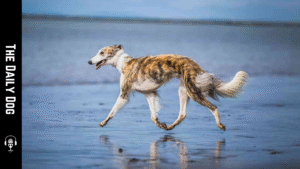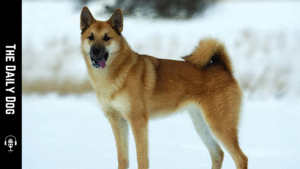When people think of Korea, they may picture vibrant cities like Seoul, K-pop, or the country’s rich cultural traditions. But did you know Korea also has a national dog? The Korean Jindo is officially recognized as the national breed of South Korea, a symbol of loyalty, courage, and the deep bond between dogs and humans.
At Alaska Dog Works, we’ve spent more than two decades training dogs of all breeds, from service animals to therapy dogs. With the launch of Seoul Dog Works, our first international branch, we’re excited to help families in Korea and abroad better understand the Jindo and what makes this breed so unique.
In this article, we’ll explore the origins of the Jindo, its characteristics, and what it means to bring this iconic dog into your family.
The Origins of the Jindo
The Jindo takes its name from Jindo Island, located off Korea’s southwest coast. Until 1984, the island was geographically isolated from the mainland. This separation allowed the Jindo to develop relatively free from outside influences, preserving its distinct characteristics for centuries.
Originally, the Jindo was a hunting dog. Islanders relied on these medium-sized, spitz-type dogs to track and capture game, from rabbits and deer to wild boar. Their keen sense of direction, independence, and fierce loyalty made them invaluable partners.
In time, Jindos also became trusted guard dogs. Families came to rely on them not just for protection but for companionship, a role they still play today.
In 1962, the Jindo was designated as Korea’s National Treasure No. 53, a cultural asset meant to be protected for future generations. This recognition reflects the breed’s deep cultural and historical significance.
Physical Traits of the Jindo
The Jindo is a medium-sized, spitz-like breed. Key features include:
Size: Typically 18–22 inches tall at the shoulder and weighing 30–50 pounds.
Coat: A double coat suited for Korea’s cold winters and hot summers. Common colors include red, white, fawn, black, brindle, and gray.
Build: Strong, athletic, and well-balanced with erect ears and a curled tail.
Expression: Alert and intelligent, with a gaze that communicates confidence and focus.
While not flashy, the Jindo’s appearance reflects its working roots, sturdy, capable, and adaptable.
The Temperament of the Jindo
What truly sets the Jindo apart is not its looks but its personality. Known for their unwavering loyalty, Jindos often form an especially strong bond with one person in the household, though they remain affectionate with the whole family.
Key temperament traits include:
Loyalty: Stories abound of Jindos traveling miles to return to their homes or families after being separated.
Courage: Historically fearless hunters, Jindos are known for their bravery and self-confidence.
Intelligence: Highly trainable but also independent, Jindos learn quickly but require consistent, fair handling.
Cleanliness: Many owners note the Jindo’s cat-like grooming habits and minimal doggy odor.
Guarding Instincts: While not aggressive, Jindos are naturally watchful and will alert their families to strangers.
Because of their independence and strength of character, Jindos are not always the best match for first-time dog owners. They require training, structure, and a confident handler to thrive.
The Jindo in Korean Culture
The Jindo isn’t just a dog, it’s a cultural icon. In Korea, the breed symbolizes fidelity and bravery. Statues and monuments of Jindos can be found across the country, especially on Jindo Island itself.
One of the most famous stories involves a Jindo named Baekgu, who became separated from her family and traveled nearly 300 kilometers over the course of seven months to return home. Her story touched the nation and reinforced the Jindo’s reputation for loyalty.
Today, the Jindo remains a point of pride for Koreans worldwide. Whether featured in literature, media, or family stories, this breed embodies the values of devotion and resilience.
Owning a Jindo: What to Expect
If you’re considering adding a Jindo to your household, whether in Korea or abroad, it’s important to understand the breed’s needs and tendencies.
Training and Socialization
The Jindo’s intelligence and independence mean that traditional “cookie-cutter” obedience classes may not cut it. They excel when given structured, consistent training and clear leadership. At Alaska Dog Works, we emphasize handler coaching as much as dog training, which is exactly what Jindos require.
Early socialization is also critical. Jindos can be reserved with strangers and wary of other dogs, so controlled exposure to new environments, people, and animals helps build confidence and adaptability.
Exercise Needs
Bred as hunters, Jindos are athletic dogs with high endurance. They need daily exercise, not just a quick walk around the block. Activities like hiking, running, and structured play are ideal.
Living Arrangements
Jindos adapt well to both urban and rural environments, but they thrive in homes with secure fencing and space to roam. Their strong prey drive makes off-leash freedom risky unless highly trained.
Health
Generally healthy, Jindos can live 12–15 years. Common health considerations include hip dysplasia and hypothyroidism, but careful breeding and regular veterinary care minimize risks.
The Jindo Beyond Korea
While the Jindo is Korea’s national dog, its reputation has spread globally. In the United States, Canada, and Europe, small but dedicated communities of Jindo owners cherish the breed.
Exportation is regulated, and the South Korean government maintains strict controls to preserve the breed’s integrity. Still, international recognition is growing, with kennel clubs such as the United Kennel Club (UKC) in the U.S. recognizing the Jindo.
For families relocating between Korea and other countries, this creates unique training needs. Dogs must adjust to new cultural environments, travel requirements, and expectations. That’s where programs like Seoul Dog Works can provide invaluable support.
How Seoul Dog Works Supports Jindo Owners
With the launch of Seoul Dog Works, we’re bringing Alaska Dog Works’ expertise in training and handler coaching directly to Korea.
Our membership-based model is especially well-suited for Jindo owners. Why? Because the Jindo’s independence and loyalty mean they require ongoing guidance, not just one-time classes.
Through The Pack™ membership in Seoul, dog owners receive:
Real-time coaching via live video twice a week, including one session tailored to Korean time zones.
Mini-group sessions during our quarterly visits to Seoul.
One-on-one coaching for specialized needs, including advanced obedience, service training, or therapy certification.
Community access, connecting Jindo owners with a supportive network of handlers and trainers.
We also partner with Rebel Rescue to provide training for adopted dogs, many of whom are Jindos or Jindo mixes. This ensures that rescued dogs get the structure and support they need to succeed in forever homes.
Why the Jindo Represents More Than Just a Dog
Every country has animals that embody its spirit. For Korea, the Jindo is more than a national dog, it’s a symbol of resilience, loyalty, and the unbreakable bond between humans and canines.
Just as Alaska has its own heritage of sled dogs that shaped survival and exploration, Korea has the Jindo, a breed forged by geography, tradition, and necessity. At Alaska Dog Works, we see a natural connection between these cultural icons. Both sled dogs and Jindos teach us about partnership, trust, and working together to thrive in demanding environments.
In Closing…
So, what is Korea’s national dog? It’s the Jindo, a loyal, courageous, and intelligent breed whose story is woven into Korea’s history and culture.
If you’re living in Korea or relocating there with your family, the Jindo may be part of your journey, whether as a companion, a cultural encounter, or even as your next dog. With the launch of Seoul Dog Works, we’re proud to support families and their dogs in Korea, combining over 20 years of expertise with a deep respect for local traditions.
Interested in learning more? Schedule a strategy call with Alaska Dog Works today, and discover how we can help you and your dog, whether in Alaska, Korea, or anywhere your journey takes you.
We offer a FREE Strategy Call.
Click on the graphic to learn more
Read More


Silken Elegance: The Silkeb Windhound and Its Timeless Allure







